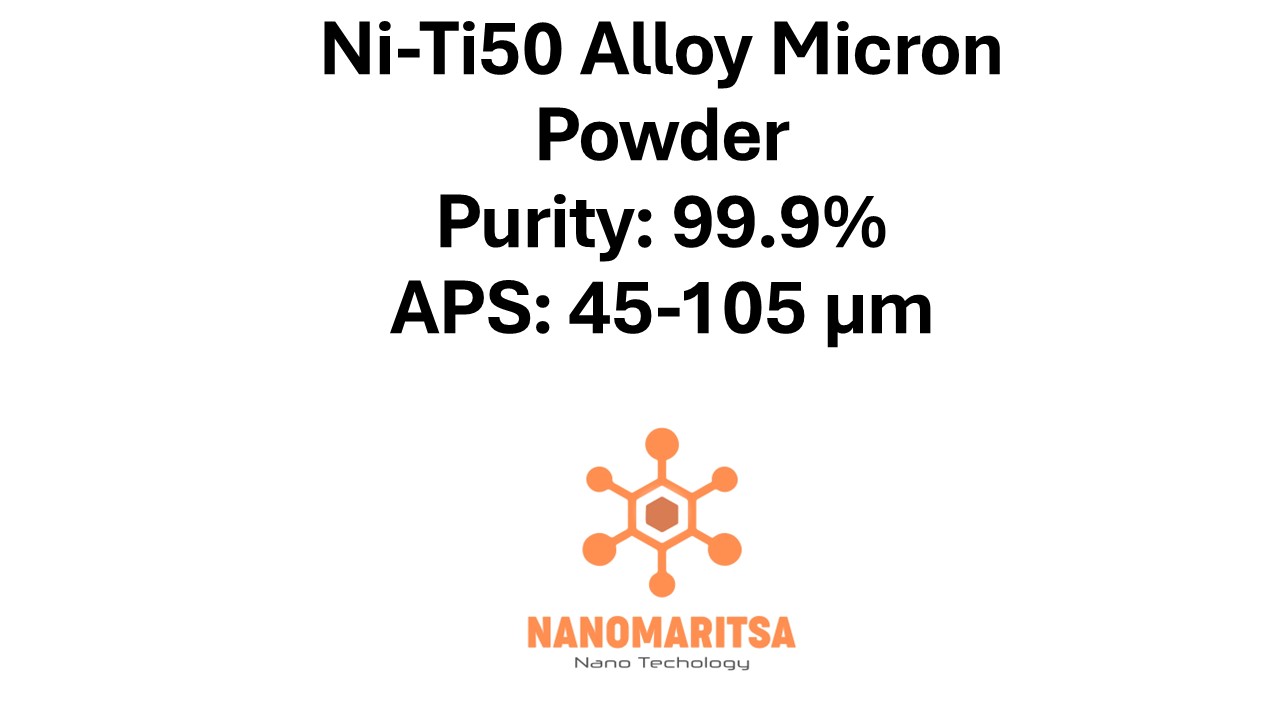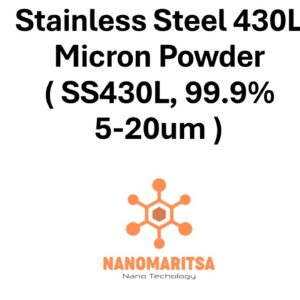Ni-Ti50 Alloy Micron Powder (Purity: 99.9%, APS: 45–105 µm) is a high-purity nickel-titanium alloy powder, commonly referred to as Nitinol. This material is well-known for its unique shape-memory effect, superelasticity, and excellent biocompatibility. With a particle size range of 45 to 105 micrometers and a purity of 99.9%, this alloy powder is ideal for advanced manufacturing applications, particularly in medical, aerospace, and industrial sectors.
1. Key Properties
Shape-Memory Effect Recovers its original shape when subjected to a specific temperature, making it ideal for precision applications.
Superelasticity Demonstrates high elasticity under stress, providing durability in mechanical applications.
Biocompatibility Safe for use in medical devices and implants, reducing the risk of adverse reactions.
Corrosion Resistance Offers excellent resistance to oxidation and degradation, ensuring durability in harsh environments.
Thermal Stability Maintains performance in varying temperature ranges, critical for dynamic applications.
Nickel-Titanium Composition (50% Ni, 50% Ti) Balances strength, flexibility, and responsiveness.
2. Applications
Medical Devices Widely used for producing stents, orthodontic wires, and surgical instruments due to its shape-memory and biocompatibility.
Aerospace Components Suitable for lightweight, high-strength components that require resilience to thermal and mechanical stresses.
Robotics and Actuators Utilized in smart actuators and robotic components requiring precise movement and control.
Additive Manufacturing (3D Printing) Ideal for fabricating complex parts with superelastic and shape-memory properties.
Industrial Applications Used in couplings, seals, and other components that benefit from its elasticity and wear resistance.
Energy Systems Supports the development of energy-efficient actuators and heat engines.
3. Advantages
Shape-Memory and Superelastic Properties Provides unmatched performance in precision and dynamic applications.
High Biocompatibility Essential for medical devices, minimizing risks in human applications.
Durability and Corrosion Resistance Ensures longevity in harsh and variable environments.
Enhanced Flowability The uniform particle size supports efficient processing in additive manufacturing and powder-based techniques.
Thermal and Mechanical Adaptability Maintains performance under significant temperature fluctuations and mechanical stress.
4. Recent Trends and Research
Advanced Medical Technologies Research focuses on optimizing Nitinol for minimally invasive surgical devices and patient-specific implants.
Aerospace Applications Studies are enhancing the material’s use in high-temperature and lightweight components for aerospace systems.
Robotic Innovations Efforts are directed toward integrating Nitinol in smart actuators and precision robotics.
Additive Manufacturing Advancements Advances in 3D printing are improving the processability and mechanical properties of Ni-Ti50 powders.
Energy Efficiency Investigations explore the use of Ni-Ti50 in energy harvesting and efficient thermal management systems.
5. Future Prospects
Medical Device Evolution Nitinol’s biocompatibility and dynamic properties will continue to drive its use in innovative medical tools and implants.
Aerospace and Robotics Its superelasticity and thermal stability will expand its applications in advanced aerospace components and robotics.
Smart Actuators and Sensors Increasing demand for responsive materials will highlight its role in next-generation actuators and sensors.
Additive Manufacturing Growth Adoption in 3D printing will expand with the need for high-performance, complex components.
Sustainable Solutions Its use in energy-efficient systems will support advancements in green and renewable technologies.
With its 99.9% purity, 45–105 µm particle size, and exceptional shape-memory, superelastic, and biocompatible properties, Ni-Ti50 Alloy Micron Powder is a vital material for cutting-edge applications in medical, aerospace, and industrial sectors. Its adaptability and innovative capabilities make it a cornerstone of modern engineering and manufacturing.
| Measurement (gr) | 100 grams, 500 grams, 1000 grams |
|---|






